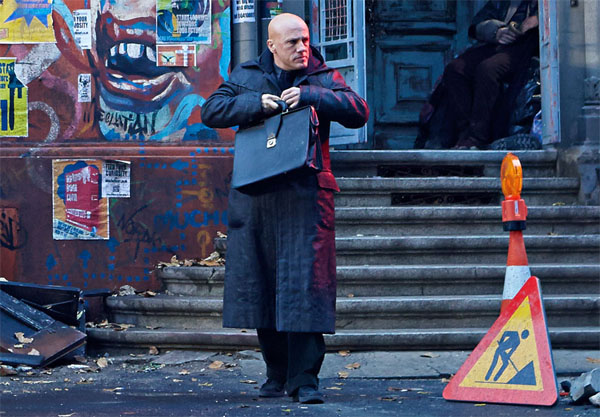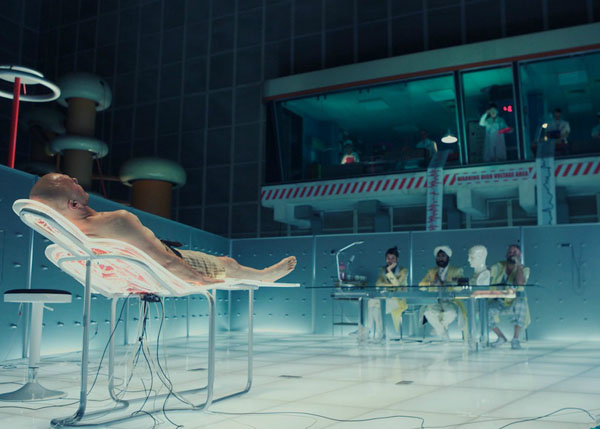In the run-up to today’s premiere of The Zero Theorem in Venice, Terry Gilliam‘s been talking. And he’s a great talker. Regarding, for example, Syfy’s TV series based on 12 Monkeys (1995), going into production in November, he’s told Screen Daily‘s Michael Rosser, “It’s a very dumb idea.” With Deadline‘s Mike Fleming Jr., he’s talked money (Zero Theorem was “incredibly cheap”) and technology (“there is a scattering of our lives”), and with the Playlist‘s Kevin Jagernauth, inspiration (Neo Rauch for ZT) sprinkled with amusing asides: “I don’t want to keep spreading that rumor about the death rate of my films!”
Gilliam’s given a clip (1’36”; see below) from The Zero Theorem to Entertainment Weekly and broken it down for them (and back in July, when ZT was still in post-production, a trailer appeared); and a couple of weeks ago, he released a director’s statement many have been unable to resist quoting in full. I won’t resist, either:
When I made Brazil in 1984, I was trying to paint a picture of the world I thought we were living in then. The Zero Theorem is a glimpse of the world I think we are living in now. Pat Rushin’s script intrigued me with the many existential ideas he had incorporated into his funny, philosophic, and touching tale. For example: What gives meaning to our lives, brings us happiness? Can we ever be alone in our increasingly connected and constricted world? Is that world under control or simply chaotic? We’ve tried to make a film that is honest, funny, beautiful, and surprising; a simple film about a complex modern man waiting for a call to give meaning to his life; about inescapable relationships and the longing for love, full of quirky characters and sparkling performances; raising questions without offering obvious answers. Hopefully, it’s unlike any film you have seen recently; no zombies, no caped crusaders or alien spacecraft. Actually, I might have lied about that last item. Having not worked with a budget this small for several decades, I was forced to work fast and instinctively, pressured only by time and money. We relied on the freedom to spin on a dime, to make outrageous creative leaps. The results surprised even me. I’m proud to have been part of The Zero Theorem.
“Here’s a paradox,” suggests Leslie Felperin in Variety: “Everyone admires Terry Gilliam’s weeble-wobble determination to keep making films despite terrible bad luck, and yet the films themselves, even the ones with relatively misfortune-free production histories, are desperately hard to admire. A case in point is The Zero Theorem, a sci-fi confection that, at best, momentarily recalls the dystopian whimsy of the director’s best-loved effort, Brazil, but ends up dissolving into a muddle of unfunny jokes and half-baked ideas, all served up with that painful, herky-jerky Gilliam rhythm.”
At Little White Lies, David Jenkins is more forgiving, suggesting that Gilliam “has well-and-truly pinned down what his ‘thing’ is—think of it as a nice, comfy groove in the sofa. And so with his latest, The Zero Theorem (his follow-up to the unfairly maligned fantasia, The Imaginarium of Doctor Parnassus), he has created a kind of visual, aural and intellectual trove of Gilliamiana, referencing Bruce Willis’s bald goon from 12 Monkeys, the ornate animation from his Python days and a sense of grubby clockwork wonder from pretty much everything else. Oh, and the plot (part and parcel) from Brazil…. Yet this is probably the director’s most cogent and crisp work in some time.”
The story, explains Oliver Lyttelton at the Playlist, “centers on Qohen Leth (Christoph Waltz), a nervous, very bald man who lives in a church, has spent his life waiting for a mysterious phone call, and works as an ‘esoteric data’ cruncher for the Mancorp corporation. His only real point of contact in the world is his supervisor Joby (David Thewlis)… Joby introduces Qohen (pronounced, as he’s keen to remind everyone, as ‘Cohen’) to the company’s leader Management (Matt Damon), and they let him have his wish in exchange for working on solving the Zero Theorem—an equation where 0 = 100, and that essentially proves that existence is meaningless, something that his own temperament is uniquely suited to. It’s sent plenty of others crazy over time, and threatens to send Qohen that way, but can the encroachment on his home of eccentric semi-call-girl Bainsley (Melanie Thierry), and Management’s son Bob (Lucas Hedges) help him keep his grip on reality?” All in all, The Zero Theorem “might not be a return to the form of Time Bandits, Brazil, The Fisher King, and 12 Monkeys, but it’s a lot better than what we’ve had from Gilliam in the last decade, and we sincerely hope there’s plenty more to come.”
Updates: “It’s anarchic, sometimes amusing, intermittently tedious, with ideas about digital alienation and the corruption of technology that too often feel blunt and tired,” writes Time Out London‘s Dave Calhoun. “What it’s most lacking is humour (there’s a shopping centre called Occupy Mall Street: we need more of that) and a sense that it knows something we already don’t. But it’s hard to knock Gilliam’s scattershot imagination, and Waltz anchors the madness in a solid, disturbed, but not too frenzied performance as Leth.”
“Gilliam, whose origins as an animator show up in the images he dreams up for every one of his films, already had a lot of fun with some of these concepts in Monty Python’s The Meaning of Life (1983),” writes Dan Fainaru for Screen Daily. “His cast follows his excesses with a relish and never without a touch of irony, whether it is Christoph Waltz’s tormented Man in Doubt, Melanie Thierry’s cutely Monroesque Brainsley or David Thewlis’s cynical Joby. The film looks spectacular and Gilliam’s faith in Nicola Pecorini’s camera work, which has held fast for the last 15 years, is once again fully justified.”
“The Zero Theorem is a sagging bag of half-cooked ideas, a dystopian thriller with runaway dysentery, a film that wears its metaphorical trousers around its metaphorical ankles,” writes the Guardian‘s Xan Brooks. “In fits and starts, I quite enjoyed it…. It is a wilfully iconoclastic film from a wilfully iconoclastic man.”
Updates, 9/3: At In Contention, Guy Lodge builds up to a pan: “Playing an online shrink, Tilda Swinton raps for about 30 seconds at the midpoint of The Zero Theorem—a stiff, Scots-accented Fresh Prince breakdown performed from under a broom-like hairpiece. It doesn’t advance the story in any way, but then, nothing here does; her screen is switched off and the rap passes without comment, like a slippery fart in an elevator; the onscreen witnesses look sheepish to have heard it at all…. Terry Gilliam films are hard to get made these days because Terry Gilliam films these days are kind of awful.”
The Telegraph‘s Robbie Collin finds The Zero Theorem to be “raucous but fatally confused… For a film so submerged in the anxieties of its time, Brazil has aged remarkably well, but the day after its world premiere, The Zero Theorem already feels like an older and cornier picture.”
“It doesn’t really add up to much, beyond a timely reminder that it would be better for everyone to stop uploading and downloading and just unplug and be human,” writes Deborah Young in the Hollywood Reporter.
Update, 9/7: “The new film may not possess the grand view and crazed narrative propulsion of Brazil, but Gilliam crams a similarly dense, repressive and visually splendid nightmare of totalitarian glitz on the screen,” writes Mary Corliss for Time. “The Zero Theorem is a spectacle that demands to be cherished—as long as the society Gilliam portrays is a satire, not a prophesy.”
Update, 10/23: “How does Terry Gilliam continue to attract such cascades of goodwill?” asks James Rocarols in the Critic’s Notebook. “I don’t know anyone who wouldn’t dearly love the maverick to finally produce the masterpiece he’s been threatening his whole career.” Here, “he’s at his most unencumbered and adventurous, both visually and in terms of ideas, but unsurprisingly the film is let down by more prosaic failures like characterization and a script that could have swapped some of its mannerisms for more meat.”
Venice 2013 Index. For news and tips throughout the day every day, follow @KeyframeDaily on Twitter and/or the RSS feed. Get Keyframe Daily in your inbox by signing in at fandor.com/daily.






